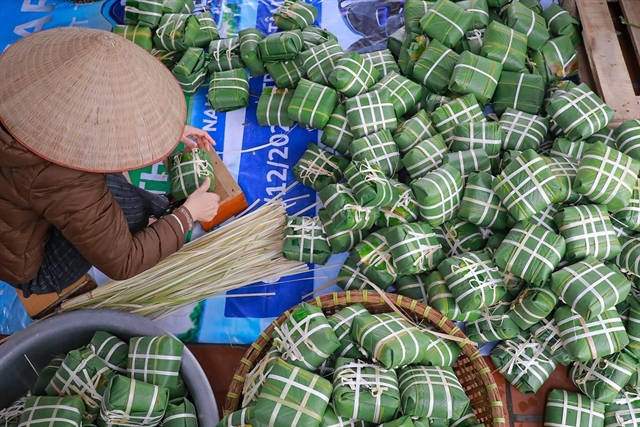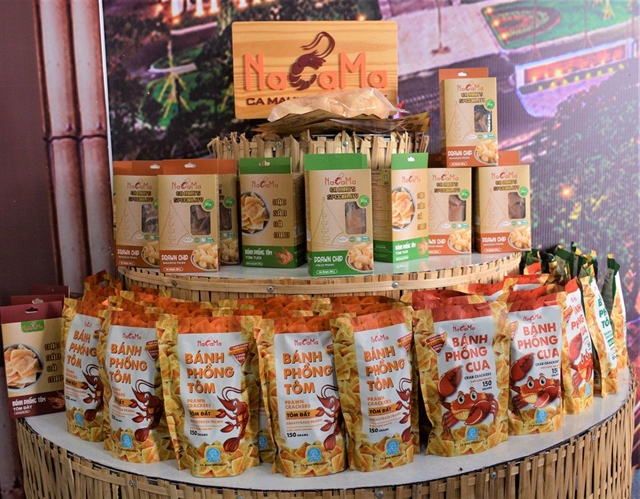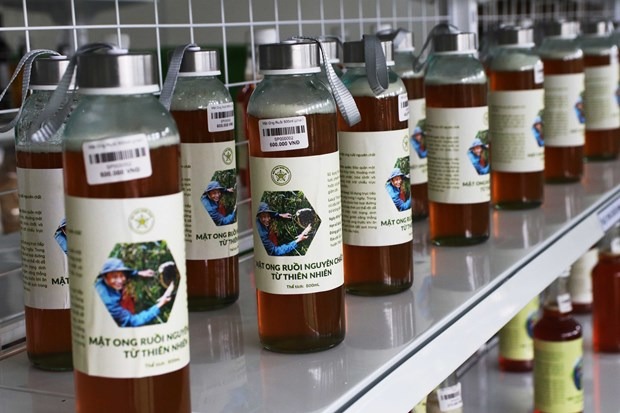 Society
Society


|
| Cà Mau recently issued many supportive policies aimed at building brands and labels for OCOP products. — Photo camau.gov.vn |
CÀ MAU — With rich natural conditions, Cà Mau has significant potential in agricultural, forestry, and fisheries production to create OCOP (One Commune One Product) products.
To leverage this potential, the province has recently issued many supportive policies to build brands and labels for OCOP products.
Consequently, several OCOP products have been granted geographical indications, certifications, and collective trademarks, enhancing the value of local speciality products in the market.
In the nearly four years of implementing the OCOP programme, Cà Mau Province has been focusing on harnessing local advantages and potential.
This includes meeting all criteria and regulations on product quality and identifying them as core values to build a brand.
As a pioneering cooperative in developing specialty products in Ngọc Hiển district, in recent years, Tân Phát Lợi Cooperative has not only invested in building modern infrastructure such as workshops, cold storage warehouses, solar drying houses, cake steaming machines, and vacuum packing machines, but has also emphasised building a brand.
Currently, over ten OCOP three-star products have been developed.
Bùi Văn Chương, Director of Tân Phát Lợi Cooperative, said that one of the solutions to increase product competitiveness in the market, besides improving quality, is focusing on the design and packaging of products.
Each product is equipped with barcodes, QR codes, and complete information to reassure customers when choosing the product.
The goal is to provide well for the domestic market and aim for exports to challenging and potential markets.
"In 2023, the cooperative's goal is to upgrade dried shrimp products from three stars to four stars to bring the product to the international market," stated Chương.
Lê Hoài Phương, Deputy Head of the Department of Agriculture and Rural Development of Ngọc Hiển District, said that local authorities have been implementing various activities to support producers and cooperatives in improving production capacity, developing brands and designs, improving product models and packaging to meet the strict standards of major markets, thereby enhancing the competitiveness of local products.
According to the Department of Science and Technology of Cà Mau province, 14 entities with OCOP products currently use collective trademarks, eight entities use certification marks, and 30 OCOP entities have registered common trademarks for protection.
In the 2021-2025 period, the department continues to implement a programme to support businesses in improving productivity and quality based on the province's scientific, technological, and innovative foundation.
Thanks to these efforts, the programme has supported 15 OCOP entities in building and applying management systems, such as the ISO 22000:2018 food safety management system and the Hazard Analysis and Critical Control Points (HACCP) system.
Additionally, 17 OCOP entities have been supported in upgrading product profiles, focusing on management criteria such as style, product labelling, intellectual property ownership, product quality assurance, and product packaging.
To support OCOP entities in building successful brands, Phan Tấn Thanh, Director of the Department of Science and Technology of Cà Mau province, said that the department had organised numerous workshops and training sessions to discuss solutions and guide OCOP entities on labelling regulations, the application of barcodes/QR codes for source tracing, industrial property rights registration, and the proper representation of protected logos on packaging and labels.
Additionally, regular collaboration with relevant authorities and OCOP entities has been established to exchange solutions for developing collective trademarks, certification marks, geographical indications, and products associated with the province's OCOP programme through cooperative production and consumption linked to protected products in the value chain.
Promotion and advertising of intellectual property assets have been protected as well.

|
| U Minh Hạ Forest honey is a popular Cà Mau OCOP product. — VNA/VNS Photo |
Sustainable development through linkages
To overcome the issue of seasonal oversupply leading to price drops for agricultural products in general and OCOP products in particular, Cà Mau has identified product linkages in production and consumption as crucial.
This ensures sales outlets and significantly reduces input costs, increasing the competitiveness of goods in the market.
It also helps promote the application of advanced technology in production to exploit the potential and advantages of the locality, gradually moving towards a modern, sustainable, and efficient production system in the future.
From 2021 to now, Cà Mau has recorded 63 products from 45 OCOP entities on the province's source traceability information portal. Thanh said that this initiative aims to create a transparent information exchange environment, address incidents, and promptly take corrective measures to identify the origin of products.
This improves farmers' rights and simplifies the process of recording production logs and reporting work results for farmers.
Moreover, when products reach consumers, it is easy to look up information about the product's origin, allowing for the selection of genuine products and facilitating the verification of product origin information, which, step by step, can resolve situations where the source of the product is unclear.
This process positively influences the reputation of Cà Mau's OCOP products.
Digital transformation in promoting and consuming OCOP products in the province has also achieved positive results.
Buying and selling on e-commerce platforms, non-cash payments, electronic invoices, electronic tax payments, barcodes and QR codes for source tracing are becoming more convenient and developing rapidly.
Trương Hà Phương Anh, Deputy Director in charge of the Center for Initial Promotion and Business Support of Cà Mau province (iPEC), stated that based on this premise, OCOP and speciality products in the province have appeared on the province's e-commerce platforms, namely Madeincamau.com and Postmart; together with major domestic and international e-commerce platforms including Sendo, Shopee, Lazada, Tiki, Alibaba and Amazon.
Some OCOP entities have boldly transitioned from traditional sales channels to online platforms by joining TikTok. — VNS




